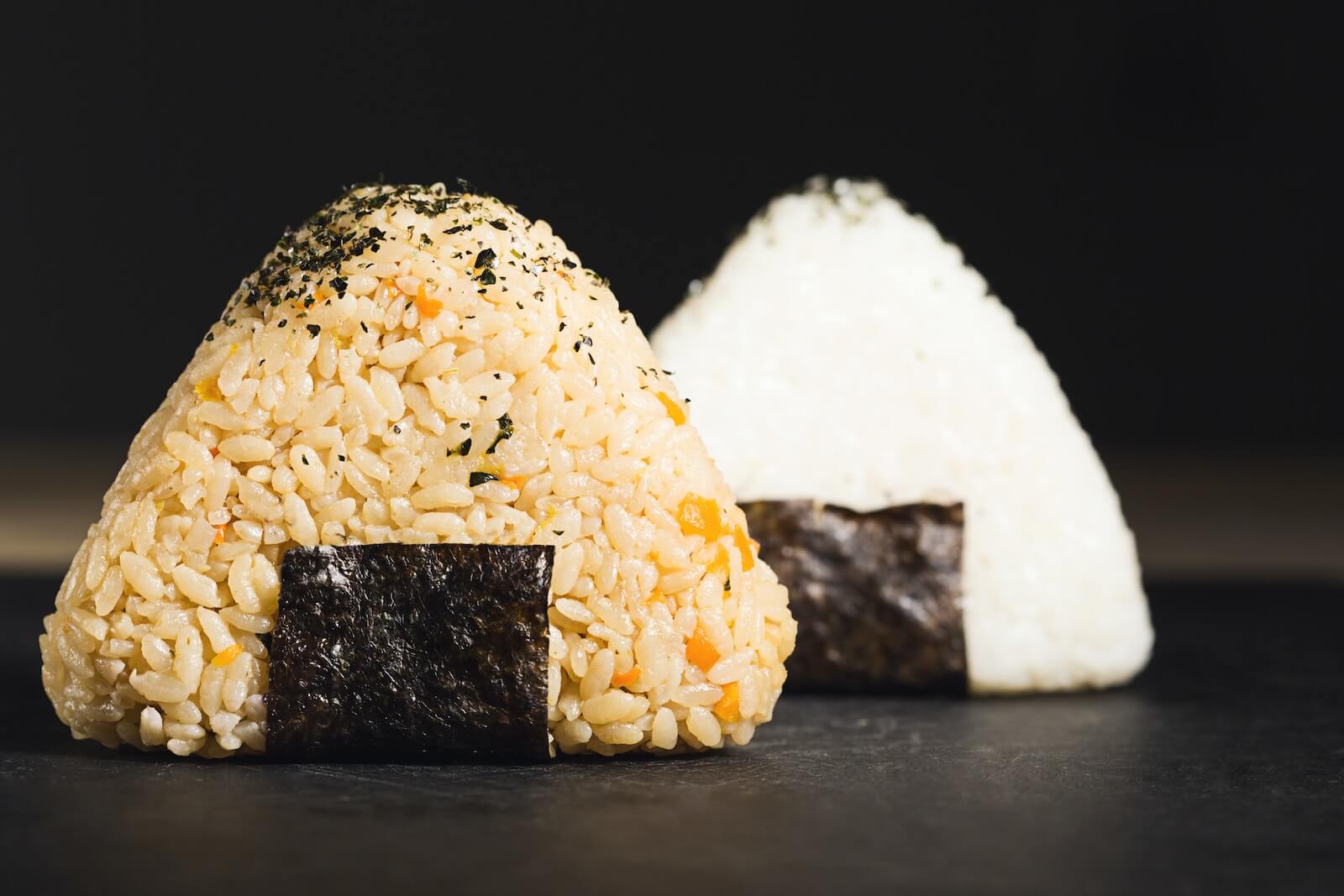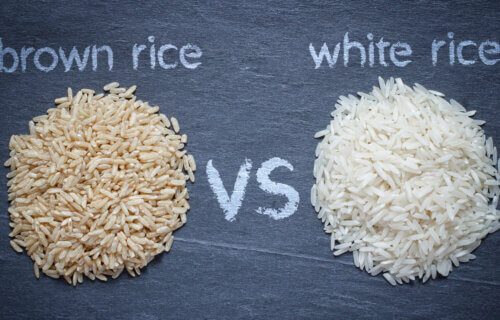For centuries, rice has been a key component across several cultures in China, Japan, India, South Korea and other Asian nations for thousands of years. According to the Rice Association, there are over 40,000 rice variations that exist, but the exact number remains unknown. In recent years, modern-day diet culture has continued to promote the idea that brown rice is healthier than white rice.
So, is that really true? Let’s take a look at the facts.
What’s the difference between brown and white rice?
Brown rice is a whole grain while white rice is not. Brown rice has the bran and germ intact, while white rice has been refined to have these removed. Given the tough bran outer layer, it typically takes longer to cook and it yields a chewier texture. The nutrients in brown rice are better retained because they are found in the bran and germ, therefore there are significantly less nutrients in white rice.

Why do people say brown rice is healthier?
Across the board, it’s generally accepted than whole grain is preferable compared to white, refined grain. This goes for breads, cereals, etc. Since brown rice is considered a whole grain, it’s often immediately deemed healthier. Given that the bran is intact, there is slightly more fiber, vitamins, and minerals. Research also suggests that brown rice digests slower than white rice, having a positive impact on blood sugar stability.
Is it actually healthier?
Brown rice has a slight edge over white rice, but it isn’t significant in the grand scheme of things. Here’s why:
1. Fiber
On average, there is only about one gram of fiber per cup of brown rice, while there isn’t any in white rice. Recommended daily fiber intake is close to 25 grams, meaning brown rice isn’t making a significant difference in your fiber intake.
2. Arsenic
Arsenic, a heavy metal, is often found in much higher amounts in brown rice. In fact, it contains close to 80 percent more arsenic than white rice. While it isn’t a huge concern unless you eat a rice-based diet, it is something to be aware of. We are already exposed to arsenic and other heavy metals through water, and other environmental factors, so it doesn’t hurt to reduce exposure through food where possible.
3. Impaired nutrient absorption
Brown rice contains more magnesium, iron, selenium, and zinc. However, that doesn’t mean you’re getting them all. Brown rice is rich in phytic acid, much more so than white rice. Phytic acid is a carb molecule that has been shown to have antioxidant benefits, but it also binds to minerals like zinc and iron.
So, while brown rice may have more minerals, your body will not fully absorb them anyway due to the phytic acid content. Many other fruits, vegetables, meats, and seafood contain an abundance of minerals.
4. Blood sugar
Brown rice has been shown to digest slower and not induce steep blood sugar spikes. White rice digests quicker and may spike it. However, most of us don’t eat rice alone. Generally, it’s paired with a protein and some vegetables. After all, the classic gym bro meal is chicken, rice, and broccoli. When refined carbs are paired with protein, healthy fats, and fiber, your blood sugar responds much better than if you ate the carbs alone.
Bottom Line
Whether you eat brown or white rice will always be up to personal preference. Some people like brown rice, and that’s okay. If you are more of a white rice person, try to pair it with a protein, healthy fat, and fiber-rich vegetable to slow digestion and make the meal more satiating.
The main issue is how brown rice is viewed as significantly healthier than white rice, when things aren’t so cut and dry. Additionally, labeling white rice as a “bad” food continues to perpetuate the idea that healthy food must fit the standard Western mold. Cultures across the world have eaten white rice for centuries, and this should be recognized.

Which lobby for white rice denuded of vitamins minerals and roughage peddled this evil? Same ones that peddled white flour? Besides, the texture of cooked brown rice is great. But Canadian wild rice is best! White processed rice and flour is no friend to your cancer colon. WTF 😒
John ISH Ishmael of Food Secure Communities Raised Box Urban Organic Gardens in Brampton ON Canada
[email protected]
Brown rice is way better. There’s a simple way to negate the phytic effect, prior to cooking
This article contradicts it’s headline almost every step of the way. Although it is correct that phytic acid reduces your bodies ability to absorb the benefits of brown rice, that problem can be easily solved by soaking your rice overnight and rinsing prior to cooking. I expect this probably also removes much of the arsenic issue, though I’d have to look into that further.
If you want to eat white rice, you can reduce it’s impact on your blood sugar by letting your rice cool before you eat it. This allows it to develop resistant starch, which takes your digestive system longer to break down, meaning that it is less able to spike your blood sugar.
There is wrong interpretation of brown rice in North America and Asia specially India Goa and Kerala
The brown rice in Goa and kerala is actually called boiled rice has lot healthier benefits the brown and white rice.
Research Noiled rice snd see rven seniors on Goa and Kerala prefer it
Has anyone eaten the forbidden rice? It’s a really dark looking purple rice that some people say is black rice. It has the highest nutrition of any rice that I know of especially when it comes to antioxidants.
Comparable nutritional value between both isn’t that significant. It’s a matter of personal preference. I’ve tried brown, but prefers white, nothing prejudicial, lol.
To each their own. It’s just a staple. For me, I stay with the millions before me who’ve subsisted on white rice for thousands of years. I’m 77 and eat it moderately like anything else
Brown rice is wonderfully healthy. My dad was a bit of a health nut and got himself on a brown rice diet. Sadly, he did so a bit too much. He began to show arsenic poisoning. Thankfully, he got off of it. Please be careful!
Unfortunately we live in the era where everyone can fund a study that proves anything u wanna
proof…some of us are dieticians and nutritionists, serious professionals with many years of experience…now, anyone can give their opinion on these topics, cr
eating chaos and confusion…well done
!
Interesting
In most developing countries (as in here in the Philippines) where white rice is the staple the standard meal among the indigents is a large quantity of white rice and a very small amount of fish. Brown rice would be healthier and more filling, but people won’t eat it due to the taste and the additional cooking time. But the issue is that the way white rice is eaten is not in moderation with significant portions of vegetables and fish as is reflected in the western diet.
I suspect that the chap responding with the practice of parboiling the rice, ditching the initial water to get rid of toxic minerals on the surface of the rice, and then completing the boiling may be something to think about if arsenic exposure is significant.
Soaking and/or cooking breaks down physic acid in brown rice. Soaking brown rice in ample water overnight reduces arsenic levels by about 80%. Glycemic level of white rice is 72. Brown rice 50. Wild rice 45…
There are tradeoffs in this world.
What is most important to you? Health or time? There are advantages of both depending on your needs.
I read this informative article as a fair, unbiased analysis of the two major variables of rice. I also understand most of your confusion. You thought you were enticed by ‘click bait! The writer made valid points and his fairness dictated full disclosure. We’ve been told to avoid white bread, flour, etc. Unhealthy!! Now we learn the difference is sooo minuscule some people feel betrayed by the processing companies.
Dumb article, it does even reinforce why brown rice is better. It is written by the white rice processors? Horrible.
I can’t believe you actually publish this for public consumption. This article is completely fraudulent drawing ridiculous conclusions.
100% my reaction, totally agree. Pieces like this are why there’s so much confusion in the health, fitness, and nutrition industry
I don’t know about brown rice Vs white rice. But wholemeal rice is definitely healthier according to research.
I have ckd; am on a modified low carb , no meat alkaline low pottasium & low phosphorus diet. Before I lift, do hit with weights or tiff & dan; I eat
white rice with peas, Indian spices and olive oil. I feel the white rice gives me sustained energy for a 3 hour workout.
Sometimes I forgo the peas and take a lysine pill. I have gone from 153 to a ripped 118 lbs on my wo & diet. Am 73.
I would chose brown rice.
https://www.ncbi.nlm.nih.gov/pmc/articles/PMC2889456/
There is no reference to the study, it’s authors, the journal is published in. There are assumptions in this article that people typically eat rice with a mixture of proteins and vegetables. However, in China, the literal transition for have you eaten yet? Is have you had your rice yet. The article lists facts does not refer to the study at all.
I hold no credentials and expertise in the science of diet and rice. But, this article looks like a thesis statement. I want to see a response from other expert out there and put out their views on the White Rice versus Brown Rice.
That’s the kind of skeptical curiosity more of us should adopt, rather than just adopting the argument of the last thing we encountered on a subject.
The refining of white rice isn’t taken into consideration.